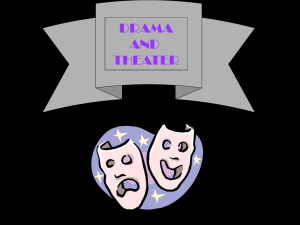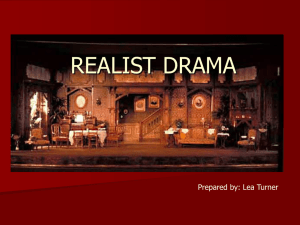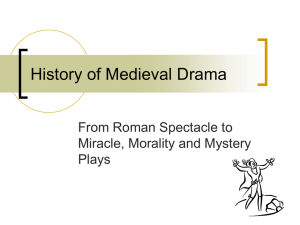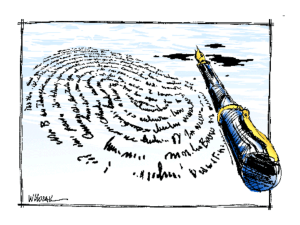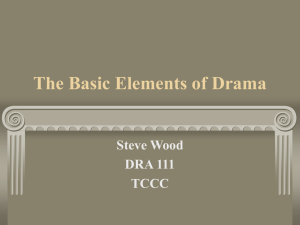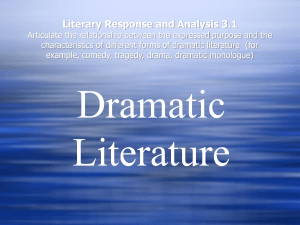DRAMA
advertisement
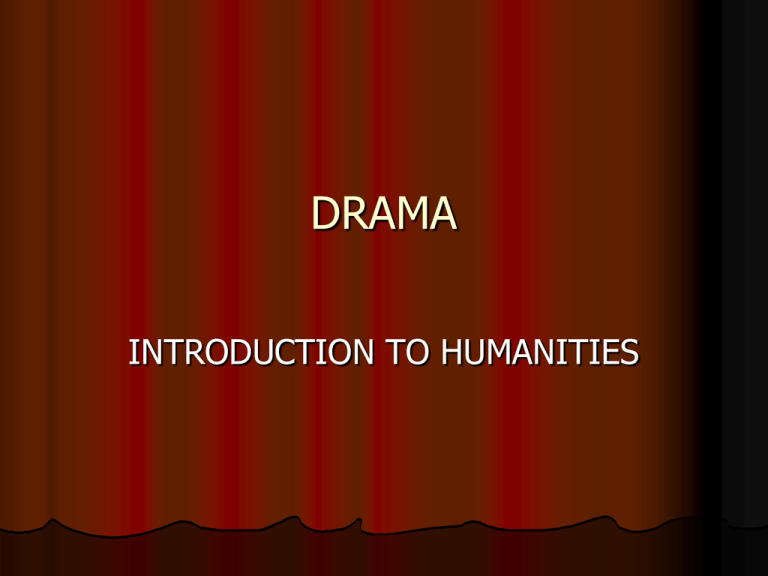
DRAMA INTRODUCTION TO HUMANITIES DRAMA Drama is a species of literature whose basic medium is spoken language. Drama can be read, somewhat like a poem or novel. But the word “drama” comes from the Greek word meaning “act.” Drama Drama is spoken language acted, to be produced for public exhibition, usually upon a stage. Drama as a complete work of art exists in the presentation. Aristotle and the Elements of Drama Much of what modern commentators say about drama goes back to theories Aristotle put forth in his Poetics. His ideas were interpreted as rules. They interpreted tragedy as a serious action whose consequences reached sometimes as far as the gods. The rules devised in the eighteenth century (and earlier) insisted on the “unities”: that there be only one plot in a tragedy, That the action should take place in one locale, that it should be completed in one day, and that the main character should display a unity of behavior. Aristotle felt that tragedy evoke or ought to evoke two emotions from the audience: Pity and fear Pity was sympathy for the tragic hero; Fear was the awareness that such a fate could be fall anyone. THE IMITATION OF LIFE No other art comes closer to life and hence drama, more than any other art. This led Aristotle to his theory of art as the imitation of nature – nature being life in general not just outdoors. ELEMENTS OF DRAMA Drama uses the resources of the theater to show human action in such a way that we gain deeper understanding of human experience. The basic elements of drama are action, character, setting, and ideas. Action is the plot or ongoing business of the characters – what they strive for, what they expect to see happen. Character is either developed or flat, Either individuated or typed, either psychological or symbolic. Setting is either established explicitly and reproduced on stage with realistic or expressionist sets, Or it is hinted at and suggested. Archetypal drama aims at symbolic or mythic interpretations of experience. For instance, one’s search for personal identity, since it seems to be a pattern repeated in all ages, can serve as a primary archetypal structure for drama. GENRES OF DRAMA: TRAGEDY Carefully structured plots were favored by Aristotle, and are usually essential in tragedies. But for the best tragedies, according to Aristotle, the action must also arise from the searching of a noble character. The strengths and flaws of the protagonist Must be factors contributing to the dramatic outcome. But when we turn to the great tragedies that most define the genre, we think immediately of great characters: Oedipus; Agamemnon; Prometheus: Hamlet: Macbeth… In most modern tragedies, such as O’Neil’s Desire Under the Elms and Miller’s Death of a Salesman, the characters still remain at the center of the drama. COMEDY: OLD AND NEW Old Comedy is associated with our modern farce, burlesque, and the broad humor and make-believe violence of slapstick. New Comedy is suave and subtle. New Comedy developed type characters, such as the gruff and difficult man who turns out to have a hear of gold, the good cop, the bad cop… TRAGICOMEDY: THE MIXED GENRE The tragic mask with a downturned mouth, and the comic mask with an upturned mouth hang on the wall of many stages. If there were a third mask, it would probably have an expression of bewilderment as is someone had just asked a totally unanswerable question. Mixing the genres of tragedy and comedy in a drama may give such a feeling. EXPERIMENTAL DRAMA The last forty years have seen exceptional experimentation in drama in the Western world. Another important thrust of experimental drama has been to assault the audience. SUMMARY The subject matter of drama is the human condition as represented by action. By emphasizing plot and character as the most important elements of drama, Aristotle helps us understand the priorities of all drama. Some archetypes seem related to the natural rhythms of the seasons and focus, Summary cont’d Comedy has several distinct genres. Old Comedy often abuses individual characters and revels in broad humor. New Comedy emphasizes the comedy of manners, a social commentary that often depends on type characters. Tragicomedy combines both genres to create a third genre. -30-


